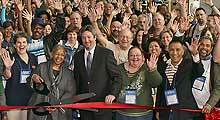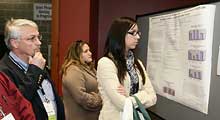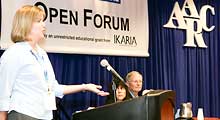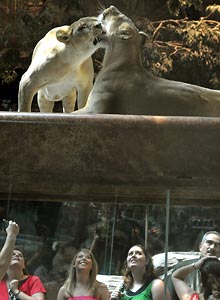Monday, December 6
8:30 am – 10:55 am
Opening Session
Sam P Giordano MBA RRT FAARC
AARC Executive Director/Presiding
8:30 am – 10:10 am
AARC Awards Ceremony
 Carolyn M Clancy
Carolyn M Clancy
10:15 am – 10:55 am
Keynote Address
Carolyn M Clancy MD
Director, Agency for Healthcare Research and Quality (AHRQ)
Washington DC
8:00 am – 6:00 pm
Sputum Bowl Preliminaries
Deborah J Hendrickson RRT/Presiding
Supported by an unrestricted educational grant from
![]()
Teams from the AARC State Societies compete in the preliminary competitions. The top four teams will advance to the Finals on Wednesday evening, Dec 8, along with the Student Sputum Bowl finalists.
 Exhibit Hall Ribbon Cutting Ceremony
Exhibit Hall Ribbon Cutting Ceremony
11:00 am
Opening of Exhibit Hall
Timothy R Myers RRT-NPS and Karen J Stewart MS RRT FAARC/Presiding
The 2010 and 2011 AARC Presidents open the Exhibit Hall. As the “Gold Standard” of all respiratory care meetings, the Congress presents all the manufacturers and suppliers in the industry. The Exhibit Hall offers attendees an opportunity to make purchases right on the spot, often at special discounts. Don’t miss this great opportunity! The Exhibit Hall will be open from 11:00 am until 4:00 pm Monday through Wednesday, Dec 6-8.
11:05 am – 11:45 am
Presenting an OPEN FORUM Abstract
Teresa A Volsko MHHS RRT FAARC, Youngstown OH
The purpose of this presentation is to introduce the neophyte research presenter to the customs, roles and experience of presenting in an OPEN FORUM session. Included will be the stages of an OPEN FORUM presentation: setting up the poster, interacting with the moderators and OPEN FORUM attendees at the posters, presenting at the podium and participating in moderated audience discussion of the research. An audience response system will be used to engage the audience in critiquing the good and bad examples of each stage of the presentation.
11:05 am – 11:50 am
Orientation for First-time Attendees
Presented by the AARC Program Committee
This program overview includes suggestions on how to maximize your time not only at the educational session, but also at the exhibits and peripheral activities.
 Open Forum
Open Forum
12:30 pm – 2:25 pm
OPEN FORUMs #1—Ventilation/Ventilators, Part 1
OPEN FORUMs #2—Monitoring/Equipment, Part 1
Clinicians present the results of their scientific studies. Abstracts with a similar focus are clustered into a symposium to encourage discussions and interactions among investigators and observers; posters expand the information presented. See abstract titles and authors.
1:00 pm – 1:40 pm
Social Networking in the Workplace: No Big Deal or HIPAA Disaster Waiting to Happen?
Colleen L Schabacker BA RRT FAARC, Cookeville TN
Much has been written about social networking and its appropriateness in the workplace. There is clearly an impact on productivity. This lecture will define the benefits and pitfalls of social networking.
1:00 pm – 1:45 pm
Long-Term Care Section Membership Meeting
Gene Gantt RRT/Presiding
Section members meet to determine their needs and priorities, as well as how to use the AARC resources to accomplish them. All Congress attendees, including section non-members are invited to attend and to participate.
 Fountains of Bellagio
Fountains of Bellagio
1:00 pm – 1:50 pm
Practical Approach to Acute Respiratory Failure: A Case-Based Discussion
Ognjen Gajic MD, Rochester MN
This presentation will cover the advanced concepts of applied physiology on an example of a patient with server shock and respiratory failure with extreme hypoxemia approached by the Rapid Response Team. Multiple overlapping critical care syndromes will be discussed including: shocking, acidosis, ARDS, sepsis, right ventricular dysfunction, ventilator-induced lung injury, acute coronary syndrome, pneumothorax. The approach to patient in extremes with severe hypoxemia will also be discussed with the audience.
1:00 pm – 2:40 pm
Aerosol Drug Administration: Concepts and Practice
1:00 pm – 1:30 pm
Assessing New Technologies: Patient–Device Interaction and Deposition
Arzu Ari PhD RRT PT CPFT, Atlanta GA
Since the introduction of the first inhaler in 1956, advances in technology have made aerosol delivery much more efficient and accessible for patients with pulmonary diseases. At the end of this presentation, participants will be able to learn new technologies available for aerosol drug delivery and assess their strengths and limitations in clinical use in terms of patient-device interaction and impact on drug deposition to the lungs.
1:35 pm – 2:05 pm
What Is the Role of Inhaled Medication in Mechanically Ventilated Patients?
Rajiv Dhand MD, Columbia MO
Inhaled medications are often administered to mechanically ventilated patients. Multiple variables influence the effectiveness of medication delivery. This presentation will evaluate the effectiveness and optimization strategies to be included in clinical practice.
2:10 pm – 2:40 pm
Optimizing Aerosol Drug Delivery in Pediatrics and Neonates
Arzu Ari PhD RRT PT CPFT
Aerosolized bronchodilator delivery to pediatrics and neonates is complex due to the multiple factors that affect the amount of aerosol deposited in the lower respiratory tract. At the end of this presentation, participants will be able to determine the factors affecting aerosol drug delivery to pediatrics and neonates and provide recommendations for optimizing the efficiency of aerosol drug administration in order to reach therapeutic endpoints in children.
 New York New York Roller Coaster
New York New York Roller Coaster
1:00 pm – 3:50 pm
Student-Centered Seminar: From Grade to Grad
1:00 pm – 1:30 pm
Becoming a Professional
Toni L Rodriguez EdD RRT, Phoenix AZ
This presentation provides an overview of the profession of respiratory care to include its evolution, role and value. Emphasis will be placed on the characteristics and traits of a professional and the critical importance of being involved and maintaining professional membership.
1:35 pm – 2:05 pm
Getting Credentialed: Part 1—the Written Exams
Bill Galvin MSEd RRT CPFT AE-C FAARC, Gwynedd Valley PA
The presentation will address the factors that make for success in the examination process. It will cover preparatory issues—what you will experience on site—as well as test-taking strategies and techniques. Emphasis will be placed on the written component of the NBRC credentialing process.
2:10 pm – 2:40 pm
Getting Credentialed: Part 2—the Clinical Simulation Exam
Bill Galvin MSEd RRT CPFT AE-C FAARC
This presentation provides an overview of the job selection process to include the resume and the interview process. Emphasis will be placed on securing meaningful and satisfying employment.
2:45 pm – 3:15 pm
Getting the Job
Colleen L Schabacker BA RRT FAARC, Cookeville TN
This lecture will provide an overview of the job selection process to include the resume and the interview process. Emphasis will be placed on securing meaningful and satisfying employment.
3:20 pm – 3:50 pm
Continuing Your Education
Lynda T Goodfellow EdD RRT FAARC, Atlanta GA
This presentation provides an overview of the continuing education needs and opportunities after completion of your RC education. Emphasis will be placed on lifelong learning and the need to continue to enhance formal education as well as professional education.
 Holiday Decorations at Caesars Palace
Holiday Decorations at Caesars Palace
1:30 pm – 3:00 pm
Living the Dream: A Tale of Two Matts
Matt Johnston, Minneapolis MN and
Matt Eddy, Boston MA
Both Matts are ventilator users but have made history with their respective stories. They will each discuss their personal journey and how respiratory therapists have helped them realize their goals.
1:30 pm – 3:15 pm
Motivating and Engaging Your Staff
1:30 pm – 2:20 pm
Success Through Motivation
Mark D Babic RRT, Cleveland OH
Success can only be achieved in today’s competitive business world through motivated employees. For a hospital to be successful, they need to find ways to not only achieve employee satisfaction but, more importantly, to fully engage them. This presentation will involve a high degree of interaction between the presenter and the audience.
2:25 pm – 3:15 pm
Integrating Respiratory Care in Your Organization: Hard-Wiring Your Value!
Mark D Babic RRT
What do nurses and physicians really want from RTs? With better integration throughout your hospital, RTs will gain visibility and respect, and your value will be understood and accepted. This will be an interactive lecture, so come ready to join in!
 Fremont Street
Fremont Street
1:30 pm – 4:55 pm
Year in Review: Part I
Presentations reviewing and discussing the most significant papers published in recent months.
1:30 pm – 2:00 pm
Invasive Mechanical Ventilation
Neil R MacIntyre MD FAARC, Durham NC
2:05 pm – 2:35 pm
Non-invasive Ventilation
Stefano Nava MD, Pavia Italy
2:40 pm – 3:10 pm
Ventilator-Associated Pneumonia
Richard D Branson MSc RRT FAARC, Cincinnati OH
3:15 pm – 3:45 pm
Pediatric Mechanical Ventilation
Robert M DiBlasi RRT-NPS, Seattle WA
3:50 pm – 4:20 pm
Aerosol Therapy
Ruben D Restrepo MD RRT FAARC, San Antonio TX
4:25 pm – 4:55 pm
Pulmonary Function Testing
Gregg L Ruppel MEd RRT RPFT FAARC, St Louis MO
1:50 pm – 2:55 pm
Clinical Controversies in Pediatric Respiratory Care: The Debate Goes On
Ira M Cheifetz MD FCCM, Durham NC and
Michael R Anderson MD, Cleveland OH
Ever wonder what the experts are saying about some of the more controversial aspects of respiratory care? This ongoing, interactive debate between two experts in the field will provide contrasting views on clinically relevant topics that routinely affect critically ill infants and children. How should PEEP be optimized? Is non-invasive ventilation indicated for all etiologies of acute respiratory failure? Should recruitment maneuvers be routinely used? These controversial topics and others will be discussed. The presentation will include interactive discussion with the audience using an automated response system.
 Grand Canal Shoppes at The Venetian
Grand Canal Shoppes at The Venetian
2:00 pm – 3:25 pm
Stopping the Revolving Door for COPD
2:00 pm – 2:40 pm
The Clinical and Economic Impact of Recidivism
Douglas S Laher MBA RRT, Cleveland OH
This presentation will describe the clinical and economic impact of unplanned readmission for patients with COPD; will discuss the root cause of recidivism and the anticipated initiatives to eventually penalize acute hospitals and physicians for excessive readmissions.
2:45 pm – 3:25 pm
A Novel Case Management Intervention to Reduce Health Care Utilization
Naresh A Dewan MD, Omaha NE
This presentation will describe an innovative case management approach for COPD patients and discuss the methodology and findings in terms of overall utilization of health care services.
2:00 pm – 3:40 pm
Understanding Sleep Disorders
2:00 pm – 2:30 pm
Understanding Sleep Apnea
Antonio Stigall MBA RRT RPSGT, Melbourne FL
This presentation will review the types of sleep-disordered breathing and discuss prevalence and symptoms associated with each condition. Surgical and non-surgical treatment modalities will be briefly discussed.
2:35 pm – 3:05 pm
Sleep and Sexual Function
James P Shaffer MD, Melbourne FL
This presentation will review sleep architecture and the relationship to endocrine function and identify sociological and environmental trends that impact sleep timing and sexual performance. The presenter will also review and define proposed sexual parasomnias.
3:10 pm – 3:40 pm
Sleep in the Intensive Care Unit
James P Shaffer MD
This presentation will review the unique aspects of sleep in the ICU and explore the effect of common sedatives and analgesics on sleep architecture and quality. The speaker will propose some basic guidelines for improving sleep in the ICU.
3:00 pm – 3:45 pm
Is BPD Inevitable
Adel Bougatef MD, Brussels Belgium
With improvements in the survival rate for extremely premature infants, the prevalence of BPD continues to rise. This increased prevalence of BPD is occurring despite prenatal lung maturation techniques, postnatal surfactant replacement therapy, and important advancements in mechanical ventilation. This presentation will review the pathophysiology of BPD as well as discuss several multifaceted management strategies aimed at minimizing chronic lung disease in the vulnerable neonatal population.
 Open Forum
Open Forum
3:00 pm – 4:55 pm
OPEN FORUMs #3—Management, Part 1
OPEN FORUMs #4—Case Reports
Clinicians present the results of their scientific studies. Abstracts with a similar focus are clustered into a symposium to encourage discussions and interactions among investigators and observers; posters expand the information presented. See abstract titles and authors.
3:05 pm – 5:00 pm
High-frequency Ventilation: Matching Technology to Pathophysiology
High-frequency ventilation is increasingly being used in neonatal and pediatric ICUs. But how do you determine which high-frequency device should be used for an individual patient? When do you use jet, oscillatory, or percussive ventilation? Does it really matter? This session will review these ventilatory strategies and their applications to specific disease states.
3:05 pm – 3:30 pm
HFJV—High-frequency Jet Ventilation
Walter L Williford RRT, Durham NC
High-frequency jet ventilation can be valuable strategy for managing neonates with acute respiratory failure. However, potential applications go well beyond this population. The indications and management strategies for jet ventilation will be discussed.
3:35 pm – 4:00 pm
HFOV—High-frequency Oscillatory Ventilation
John Arnold MD, Boston MA
High-frequency oscillatory ventilation has long been accepted as a standard approach to infants and children with severe acute lung injury. However, this approach may not be ideal for all patients. The indications and management strategies for oscillatory ventilation will be reviewed by one of the leading experts in the field.
4:05 pm – 4:30 pm
HFPV—High-frequency Percussive Ventilation
Adel Bougatef MD, Brussels Belgium
High-frequency percussive ventilation is a standard strategy in many burn units, although its application goes well beyond this patient population. Most recently, percussive ventilation saw a significant increase in use during the H1N1 pandemic. The indications and management strategies for percussive ventilation will be reviewed by one of the pioneers of this ventilatory strategy.
4:35 pm – 5:00 pm
Matching Technology to Pathophysiology: Panel Discussion
Ira M Cheifetz MD FAARC, Durham NC
Now that you have heard about the various high-frequency ventilatory strategies, how do you determine the optimal approach for an individual patient? Each of these ventilatory modalities has clear advantages and disadvantages. This presentation will review application of high-frequency ventilation based on physiology and pathophysiology. Time will be allotted for an open discussion between the audience and the panelists. Come hear what the experts have to say and offer your opinions as well.
 Holiday Decorations at Mandalay Bay
Holiday Decorations at Mandalay Bay
3:15 pm – 4:55 pm
Patient Safety in Home Care
3:15 pm – 3:45 pm
Common Safety Risks in Respiratory Home Care
David A Gourley MHA RRT FAARC, Pompton Plains FL
In this presentation the speaker will identify common safety risks for the home respiratory patient and outline risk reduction strategies; He will explain sentinel event reporting, including conducting follow-up investigations and analyzing the findings.
3:50 pm – 4:20 pm
Emergency Preparedness in Respiratory Home Care
Timothy W Buckley RRT FAARC, Chicago IL
This presentation will provide an overview of emergency management regulatory requirements with specific reference to the home care environment, and discuss the elements of an effective emergency management plan for a home care company, including strategies for identifying those most at risk for service disruption.
4:25 pm – 4:55 pm
So, What Do We Do When Patients Won’t Cooperate?
David A Gourley MHA RRT FAARC
The presenter will provide examples of types of patient non-adherence with basic safety teaching and the potential adverse consequences and discuss strategies that will encourage patients and/or caregivers to comply with basic safety practices, including actions to be taken in the event of a natural disaster.
 The Lion Habitat at MGM
The Lion Habitat at MGM
3:30 pm – 4:55 pm
Your Influence as an RT Leader
3:30 pm – 4:10 pm
Expanding Your Leadership Influence
Scott Reistad RRT CPFT, Centura CO
The speaker will outline how to expand your influence in your organization beyond the RT department and throughout your organization to establish the “brand value” of your department and your services.
4:15 pm – 4:55 pm
Influencing Cultural Change
Scott Reistad RRT CPFT, Centura CO
Many leaders are able to affect policies, staffing, procedures, and productivity in their department relatively easily. Yet, to move toward a world-class department, one must actually affect cultural change in their department from one of “technical competence” toward a culture of interpersonal excellence, teamwork, and accountability.
3:35 pm – 4:30 pm
Defending Your License
Antony L DeWitt JD RRT FAARC, Jefferson City MO
No therapist wants to face their Respiratory Care Licensure Board, but many do every year. In this presentation Attorney Anthony DeWitt, FAARC, examines the causes of licensure discipline and the various ways that therapists can come to the attention of their boards. He presents a compelling trial sequence from a real licensure case. Therapists will not want to miss this exciting and dynamic presentation. At the conclusion of this presentation you will be able to: (1) understand the key issues that cause respiratory care discipline, (2) understand the process by which boards mete out discipline, (3) understand the importance of legal counseling meeting the challenge to a therapist’s license.
 Holiday Decorations at Bellagio
Holiday Decorations at Bellagio
4:00 pm – 4:40 pm
An Evidence-based Look at Rapid Response Teams
Carl R Hinkson RRT, Seattle WA
The last several years have seen widespread adoption of rapid response systems in acute-care hospitals in an attempt to identify and manage acute patient deterioration outside the ICU setting. This presentation reviews the rationale for such systems and the published evidence for their effectiveness in reducing adverse patient outcomes and affecting cost-savings for the institution.
4:00 pm – 4:40 pm
Case Study Discussion of Ethical and Legal Issues in Respiratory Care
Joseph Goss MSJ RRT AE-C, Paramus NJ
The lecture will discuss select legal and ethical dilemmas therapists face during practice. The presentation will highlight a case to emphasize the selected ethical and legal issues. Also, it will note ways to recognize improper ethical behavior and the possible consequences of illegal actions.
4:10 pm – 4:50 pm
Circadian Rhythm Sleep Disorders
Paul A Selecky MD FAARC, Newport Beach CA
This presentation will address various sleep disorders that may impact the respiratory therapist and will discuss the impact of sleep on work performance. Types of sleep disorders discussed will include shift work sleep disorder, jet lag, as well as delayed and advanced types of circadian rhythm sleep disorders.
4:35 pm – 5:05 pm
Management Section Membership Meeting
Cheryl A Hoerr MBA RRT FAARC/Presiding
Section members meet to determine their needs and priorities, as well as how to use the AARC resources to accomplish them. All Congress attendees, including section non-members are invited to attend and to participate.
